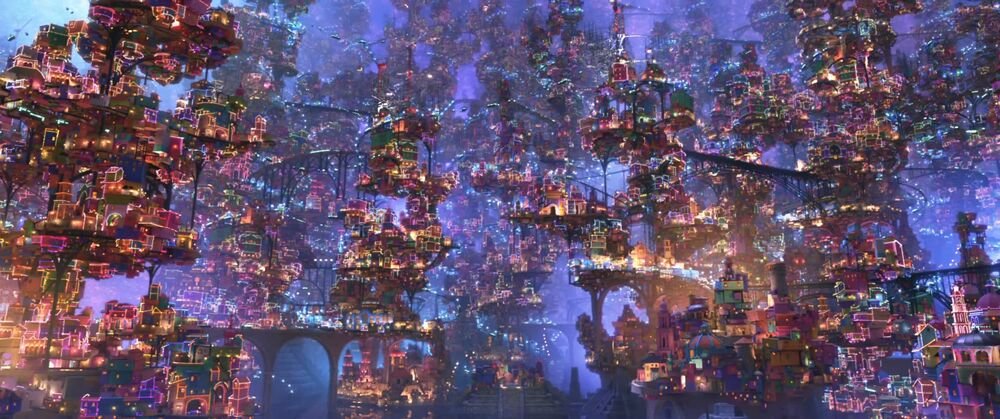Coco
Coco raises an interesting question that has echoed throughout history: what value does the deceased have, unless they continue to reside in the memories of the living? Humans have spent ages building legacies they hope will endure for eternity – a doomed enterprise of castles built on shifting sand.
And yet, Coco takes it a step further by combining legacy, love, and economic wealth into one vibrant storyline. In the Land of the Dead, one’s wealth is determined by how celebrated they are in the memories of the living. Grand stars such as Ernesto de la Cruz live in palatial estates with excess offerings, a cultural icon in death as in life. Those forgotten by their families because of age or exile, such as Héctor, live in abject poverty, slowly weakening until they cease to exist in the afterlife (presumably as well as in the collective unconsciousness).
There are several disturbing conclusions that can be drawn from this concept. The worthiness of an individual is disregarded even in the afterlife, and the injustices of societal constraints continue in death. Those who are considered the “less dead” or have been cast off from their families for perceived slights will inevitably continue to suffer after their passing. Considering most of us look to the afterlife as the place where true justice is served outside of the fickle, flawed logic of society, this is a depressing realization.
Legacy is an important consideration for anyone. In fact, I highly recommend exploring what legacy means to you. When you have children or a significant community presence, it can be a little easier to determine what yours might look like, but when you are childfree, haven’t built an empire of a business or a charitable foundation yet, or are in the beginnings of your adult life, your definition of legacy is a little more nebulous. There are several resources on the topic; I personally recommend everyone read The Forever Letter: Writing What We Believe For Those We Love by Elana Zaiman and The Art of Dying Well by Katy Butler.
However, many of us will die without a true legacy. And with family units being more fractured than ever, who will leave your picture on an ofrenda?
Leave it to Disney to make us all have an existential crisis in a dark theater with a bunch of enraptured 5-year-olds.
Legacy as a form of currency is a fascinating concept. While there are certainly flaws, it is comforting to think that the love we receive in life will translate into a cozy existence on the other side. Legacy will sustain you as money did in life. The fading of the dead will be inevitable, but ideally, you will be fading at the same time of the rest of your known society with the souls of your loved ones surrounding you.
The Land of the Dead is constructed on the bones of millennia of the collective experience of life and death, demonstrated by a single clip at the very end of the movie: the soaring cobblestoned streets of the city built on the dark bones of Mesoamerican pyramids. Only the richest of gods would survive the ages, and even then, all souls (godly, cultural icons, or otherwise) will eventually succumb to the weathering of time.
Nothing is truly meant to last forever. Not even in the afterlife. But there is something special about a culture that appreciates the role of death in life, unlike so many of our many fearful Western ones. Coco is a love letter to Día de los Muertos, and to those who make remembrance a golden-hued celebration of warmth, food, drink, and love.
Some Simple Ways to Celebrate the Day of the Dead:
1. Watch Coco.
2. Make an ofrenda of your passed loved ones’ photos – include pets, friends, and ancestors. Add trinkets, symbols, or anything that reminds you of your roots & heritage.
3. Give thanks to the lineage that has brought you here today. Give offerings of food, coin, drink, gifts, or anything you feel the dead would appreciate. As we learn in Coco, physical items given with intent is enough to become consumable on the other side.
4. Consider your legacy and what you have, and plan to, leave behind. Reflect on your relationship with death and contemplate how you can make it healthier in the upcoming year.
5. Reflect on how your ancestors, known and unknown, can guide you in the upcoming year, and how you can continue to build a relationship with them when Día de los Muertos is over.
Sources:
https://en.wikipedia.org/wiki/Coco_(2017_film)
https://www.adelantemujeres.org/blog/how-to-make-a-magical-ofrenda-in-7-small-steps
https://www.si.edu/stories/5-facts-about-dia-de-los-muertos-day-dead







